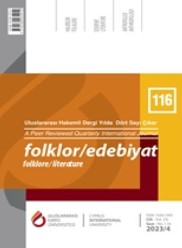Antalya’da Definecilik ve Define Folkloru Üzerine
On Treasure Hunting and Treasure Folklore in Antalya
Author(s): Erdal Taşbaş, Gökhan TiryakiSubject(s): Archaeology, Cultural history, Customs / Folklore, Oral history
Published by: Uluslararası Kıbrıs Üniversitesi
Keywords: Antalya; treasure; motifs; beliefs; folklore;
Summary/Abstract: The definition of museums as the only acceptable place to store valuable artifacts and archaeology as the only professional group that can reveal these artifacts emerged in the 19th century. Before this date, valuable/worthless remains under the ground were the area of interest for antique dealers, collectors, and treasure hunters. The fact that it has become a universal cultural phenomenon, since it is not a behavior specific to a particular time or region of the world, archaeology has encouraged the economic and cultural dimensions of treasure hunting to be embraced by academic circles. Antalya, one of the leading centers of our country in terms of ancient artifacts, has a critical importance when it comes to research on both treasure hunting and treasure hunting culture. Treasure hunting activities, that have taken place in Antalya, extending from the coastal areas to the high plateau regions since the last half century, the number of these activities have exceeded the number of scientific archaeological excavations and surface research. This situation has been discussed in a substantial number of studies published in the recent past within the framework of its judicial and/or protection-oriented weaknesses and cultural aspects. In addition, we aim to contribute to the existing literature with a study that deals with treasure hunting activities in Antalya with examples from history and in the cultural and folkloric context. Here, we focus on some motifs used in the folklore of treasure hunting in Antalya and their continuity, through a series of documents, most of which are introduced to the literature for the first time. We have seen that the information we obtained from investigations on the memoirs recorded in the travelogues and the forensic events recorded in the Ottoman Archive documents conveyed any treasure hunting activities in a way that describes the local beliefs and practices. As a result, the study not only provides the opportunity to read treasure hunting narratives transmitted from different sources, but also gives the opportunity to review the cultural and historical backgrounds of such activities.
Journal: Folklor/Edebiyat
- Issue Year: 29/2023
- Issue No: 116
- Page Range: 1063-1076
- Page Count: 14
- Language: Turkish

